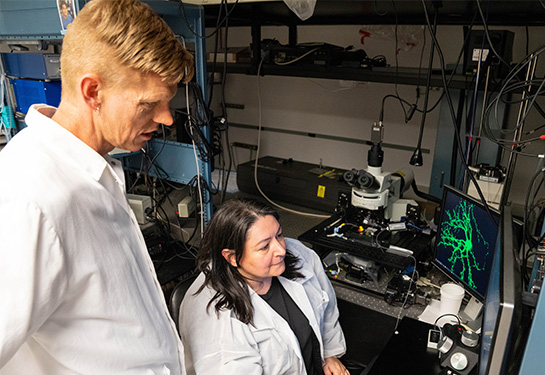New insights into FXTAS could inform future research and clinical trials
Long-term MIND Institute study is the first to define how people with FMR1 genetic variant progress to disease
After following a group of patients with a specific gene mutation for many years, a team of UC Davis MIND Institute scientists has provided important insights into how fragile X-associated tremor/ataxia syndrome (FXTAS) first develops. The work, led by researchers David Hessl and Susan Rivera, identifies new ways to study the disease and possibly test potential therapies in the future. FXTAS, caused by “premutation” expansions of the FMR1 gene, has no approved treatments, only symptomatic management. The study was published in the Journal of Neurodevelopmental Disorders.
FXTAS is genetically related to fragile X syndrome. Both are caused by different sized mutations in the FMR1 gene, but the symptoms and age of onset are vastly different. Fragile X syndrome arises during early development, causing intellectual disability, other learning problems, and autism-related characteristics, while FXTAS usually begins in late adulthood and is primarily a neurodegenerative movement disorder.

Not everyone who has the FMR1 premutation develops FXTAS, which causes cognitive decline, tremor and balance issues similar to Parkinson’s disease. FXTAS was discovered at the MIND Institute by researcher Randi Hagerman and her colleagues in 2001.
“People, particularly men, who have this premutation variant of the FMR1 gene are at high risk of developing FXTAS later in life,” said Hessl, a professor in the Department of Psychiatry and Behavioral Sciences. “But we haven’t known how to predict who will develop the disease or how quickly it will progress. Also, if we’re conducting a treatment study, we don’t yet know the best ways to track response to the intervention. We needed to establish key metrics for clinical severity.”
Hessl and Rivera, who is professor and chair in the Department of Psychology, have been following 64 men who carry the FMR1 premutation, many for 15 years or more. The research team is also following a group of men without the premutation as study controls. This is the first time FMR1 carriers have been tracked in a long-term (longitudinal) study.
The researchers wanted to investigate which participants began showing the earliest measurable signs of FXTAS, and when. Symptoms include trembling of the limbs with movement (intention tremor), uncoordinated walking (gait ataxia), and cognitive decline.
Simultaneously, the team has been looking for biological and brain imaging markers that would help clinicians identify patients during the earliest stages of the syndrome – even before they showed obvious symptoms – to intervene more effectively.
There are treatments being developed for FXTAS that could be tried earlier in individuals who are most at risk. Getting a patient started on a prophylactic regimen before they show obvious signs of disease might be more effective than waiting until it is further along.” —David Hessl, professor, Department of Psychiatry and Behavioral Sciences
Learning how FXTAS progresses
Of the 64 participants, 18 have developed FXTAS so far. During their progression, the researchers identified a number of early indicators, such as loss of visual working memory, manual dexterity and movement speed, indicating they were developing FXTAS.
“Those tasks tap into brain circuits that are already starting to deteriorate before they develop motor signs that a neurologist might see in an exam,” Hessl said.
Clarifying the syndrome’s pathological evolution will be an enormous benefit for clinical researchers, as they now have a template to measure patient responses to therapy. In addition, as new treatments emerge, these metrics could help guide care.
“There are treatments being developed for FXTAS that could be tried earlier in individuals who are most at risk,” said Hessl. “Getting a patient started on a prophylactic regimen before they show obvious signs of disease might be more effective than waiting until it is further along.”
In addition to his research, Hessl also directs the International Fragile X Premutation Registry, which helps physicians, scientists and families better understand FXTAS and other premutation-related conditions and prepare for future treatment studies. As a next step, the researchers and colleagues are using these and other findings to develop a validated tool clinicians and researchers can use to track progression in premutation carriers, or patients with FXTAS.
“We want to collaborate as a field and develop some well-standardized and reliable methods that can be used in future clinical trials, ideally even in clinics in different countries,” said Hessl. “It’s exciting to start making progress in this direction.”
Along with Hessl (corresponding author) and Rivera, other authors on the study included Jessica Famula (first author), Emilio Ferrer, Randi Hagerman, Flora Tassone and Andrea Schneider, all of UC Davis.
Related stories:
The UC Davis MIND Institute in Sacramento, Calif. was founded in 1998 as a unique interdisciplinary research center where families, community leaders, researchers, clinicians and volunteers work together toward a common goal: researching causes, treatments and potential prevention of challenges associated with neurodevelopmental disabilities. The institute has major research efforts in autism, fragile X syndrome, chromosome 22q11.2 deletion syndrome, attention-deficit/hyperactivity disorder (ADHD) and Down syndrome. More information about the institute and its Distinguished Lecturer Series, including previous presentations in this series, is available on the Web at mindinstitute.ucdavis.edu.




